Yankee Doodle came to town,Riding on a pony,He stuck a feather in his cap,And called it Macaroni.
A famous enough little
rhyme, if somewhat curious. It stems from the Seven Years War and it thought to
refer to the mockery of the colonial American troops by their British
counterparts. Linguists are divided upon the origin of the word Yankee,
as applied to an American, although it almost certainly is of Dutch origin,
possibly an Anglicisation of Jankee meaning Little Johnny.
Similarly, Doodle most likely comes from the German dudel meaning
a simpleton. He rides a pony, not a horse, and he puts a feather in his cap,
thinking this is enough to make him look like a macaroni. He puts on airs and
graces, he reaches above his station but it is not enough and he merely looks
ridiculous and affected. Furthermore, in aping a macaroni he looks effeminate
and ineffectual.
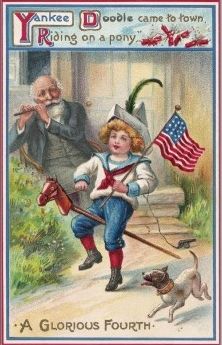 |
| Yankee Doodle |
‘A macaroni’, I hear you ask, ‘What has all this to
do with pasta’? Well, in the past, it was usual for the sons of the English
well-to-do to complete their education by taking the Grand Tour, a trip to the
must-see locations of continental Europe. Some of these young gentlemen
developed a taste for Italian pasta and brought the habit of eating it back
with them to England. At their clubs they would dine on a dish of macaroni,
something rare in England at the time, and these became known as macaroni
clubs, the name becoming applied to the diners themselves.
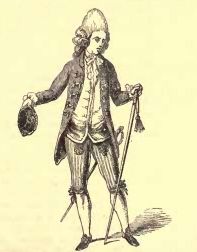 |
| A Macaroni |
They affected other
Italianate ways, in manner, dress and speech, and became infamous for their foppish,
exaggerated fashions. From about 1760, the word Macaroni superseded
other such designations as Buck, Blood, Beau, Gallant, Dandy, Exquisite
or Swell. The macaronis were noted for their excessive addiction to
gambling and for their affected dress, wearing improbably fancy wigs, carrying
long canes decorated with tassels, nosegays, eyeglasses and toothpicks. The
fashion took London by storm; everything was à la macaroni, every song,
every dance, every amusement.
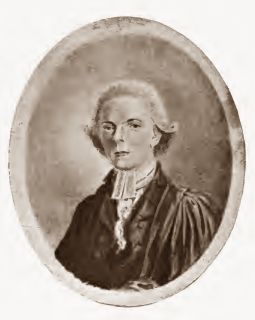 |
| Dr William Dodd |
There were turf macaronis, military macaronis,
college macaronis and every other example of the macaroni race - not least
there was Dr William Dodd, the Macaroni Parson. He was the son of country
clergyman of the same name and a graduate of Clare Hall, Cambridge who came to
London in about 1750. He had literary aspirations and tried his hand at comedic
plays although his friends persuaded him to resume his clerical career and he
was ordained as a deacon and took the position of curate at West Ham, Essex. He
applied himself to his new life with enthusiasm and quickly became a popular
and successful preacher, with a growing reputation. He preached the inaugural
sermon at the opening of Magdalen House, an occasion described in a letter to
George Montague dated January 28th 1760 by Horace Walpole, and
Dodd’s reputation for his charitable works received a further boost.
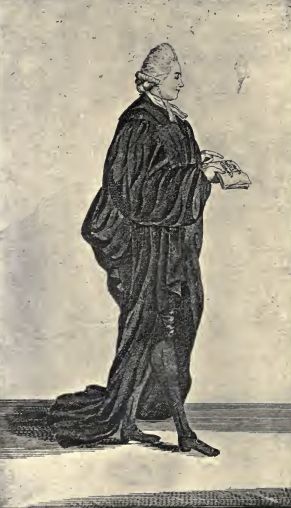 |
| Dr Dodd - The Macaroni Preacher |
He became
chaplain there, and preached moving sermons to Princes, Lords and Ladies who
were moved to tears by his words (Dodd wrote a poem to the tears shed by Lady
Hertford). He began to publish a number of edifying books and became chief
writer of the Christian Magazine, as well as contributing a weekly
column to the Public Ledger, and writing a commentary on the Bible. In
1763, he was appointed chaplain to the King and to Bishop Samuel Squire,
through whom he was also made tutor to Philip Stanhope, nephew of Lord
Chesterfield.
In 1751, Dodd had married Mary Perkins, a servant girl whom it
was rumoured had once been the mistress of the Earl of Sandwich, and in 1766
she received an annuity of £1,500 and was given a lottery ticket that won a
prize of £1,000. Dodd invested the money in opening a chapel in Pimlico, called
Charlotte Chapel after the Queen, and attracted a fashionable congregation (it
was at this time he became known famously as the Macaroni Preacher), which
seems to have turned his head, as he began to write ‘dainty verses’ to
ladies, attended city feasts and ran up debts, although no scandal was, as yet,
attached to his name.
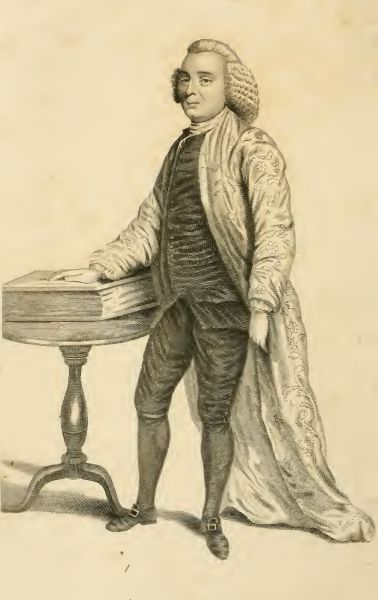 |
| The Macaroni Preacher |
That came in 1774, when Mrs Dodd wrote an anonymous
letter to Lady Apsley, wife of Henry Bathurst, the Lord Chancellor, offering
£3,000 and an annual payment of £500 thereafter, if Dodd was given the living
of St George’s, Hanover Square, said to be worth £1,500 per year. The letter
was quickly traced back to the Dodds, and William was struck off the King’s
list of chaplains. He fled to Europe, where his former pupil, now Lord
Chesterfield in his own right, received him at Geneva and treated him well. He returned to
London but growing debts caused him to sell Charlotte Chapel and on February 1st
1777, he offered a bond worth £4,200 in the name of Lord Chesterfield to a
stockbroker named Robertson. This bond was transferred to the lender’s
solicitor, who found some ink blots on it so had a clean copy made, which he
took to Lord Chesterfield to have it signed. It was revealed immediately that
the original bond was a forgery and warrants were issued for the arrest of Dodd
and Robertson.
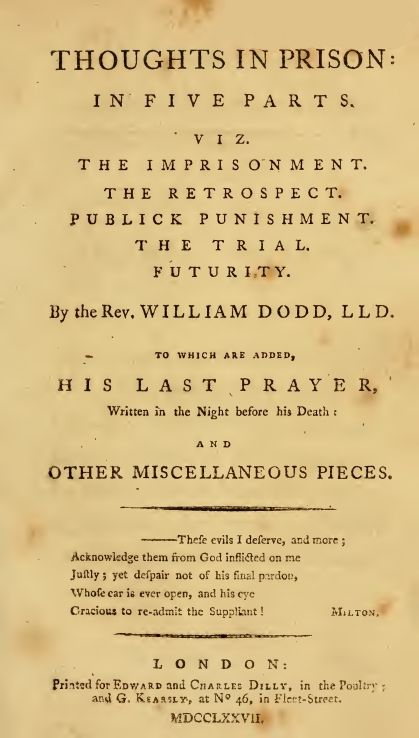 |
| Dr William Dodd - Thoughts in Prison - 1777 |
Dodd returned £3,000 and made arrangements were made to return
the rest, apparently to the satisfaction of all concerned, but the Lord Mayor
insisted that the case be brought to trial. Dodd was brought to trial on
February 22nd, and was found guilty of forgery although a legal
point delayed the passing of sentence until mid-May. In this interim, many
attempts were made to obtain a pardon for Dodd, a petition with 23,000
signatures was presented and many influential people, including Dr Samuel
Johnson, intervened on Dodd’s behalf (his case was the cause of Dr Johnson’s
famous remark,
“Depend upon it Sir, when a man knows he is to be hanged in a fortnight, it concentrates his mind wonderfully”).
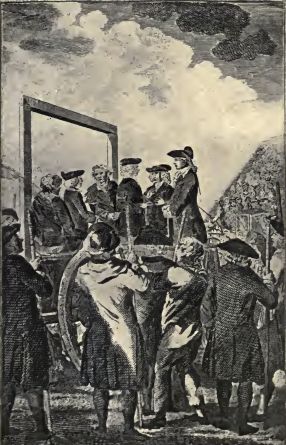 |
| Dr Dodd hanged at Tyburn |
Dodd himself wrote Thoughts
in Prison and preached sermons to the inmates of Newgate Prison but the
King, swayed it was said by Lord Mansfield, eventually decided to carry out the
sentence. On July 22nd 1777, Dr William Dodd, the Macaroni Preacher,
was conveyed to Tyburn and was hanged by the neck until he was dead.
He was the
last man to be hanged at Tyburn for the crime of forgery.
No comments:
Post a Comment